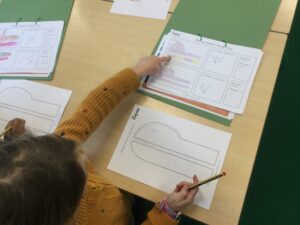‘High-quality design and technology education makes an essential contribution to the creativity, culture, wealth and well-being of the nation.’
The Primary National Curriculum Framework 2014
Aims
At Abbey CE VA Primary School, our aim is to inspire pupils to think innovatively and develop creative, practical solutions to real-world problems. We believe that Design and Technology (DT) helps pupils become resourceful, enterprising and capable citizens. Our curriculum aims to develop pupils’ skills in designing, making and evaluating products, while building their technical knowledge and understanding. We strive to ensure every child develops the creative, technical and practical expertise needed to perform everyday tasks confidently and participate successfully in an increasingly technological world.
How We Teach Design and Technology
Using Kapow Design and Technology, our approach to teaching Design and Technology follows the design, make and evaluate process, allowing pupils to develop their ideas through practical experience. Lessons are carefully structured to develop both creative and technical skills, with a strong emphasis on solving real problems through innovative thinking.
Teachers guide pupils through the complete design process, from initial research and planning through to creation and evaluation. Pupils learn to work with various tools, equipment and materials safely and effectively. We create opportunities for pupils to develop their technical understanding through practical tasks, learning about mechanisms, structures, textiles and food technology.
Food technology is taught as part of DT, with pupils learning about nutrition, food safety and cooking techniques. They develop skills in food preparation and understanding of healthy eating principles. All cooking activities are carried out with attention to strict food hygiene and safety guidelines.
Assessment is conducted through observation of practical work, evaluation of finished products, and pupils’ design portfolios. We encourage pupils to think critically about their own work and that of others, considering how designs could be improved.
What Skills and Knowledge Will Your Child Learn?
Throughout their journey at Abbey, pupils develop a comprehensive range of design and technology skills and knowledge. In the early years, children explore simple tools, techniques and materials through hands-on experiences. They learn basic joining techniques and begin to think about how things work.
As they progress, pupils develop more sophisticated skills and understanding in several key areas:
Design:
- Research and investigate existing products
- Generate innovative ideas
- Develop design criteria
- Create detailed plans and prototypes
- Use computer-aided design where appropriate
Make:
- Select and use tools safely and accurately
- Choose appropriate materials and components
- Follow safe procedures and hygiene rules
- Measure, mark, cut and shape materials
- Join and combine materials effectively
Evaluate:
- Test and evaluate their ideas and products
- Consider views of others to improve work
- Understand how key events and individuals have shaped design
- Analyse existing products for effectiveness
Technical Knowledge:
- Understand mechanical systems (levers, gears, pulleys)
- Apply their understanding of computing to program and control products
- Know how to strengthen and reinforce structures
- Understand electrical systems in their products
- Apply knowledge of materials and their properties
Food Technology:
- Understand principles of nutrition and healthy eating
- Learn basic food preparation techniques
- Develop cooking skills and recipe knowledge
- Understand food safety and hygiene
- Learn about seasonal food and food sources
By Upper Key Stage 2, pupils will have developed:
- Confidence in designing and making products
- Understanding of the iterative design process
- Skills in using various tools and materials safely
- Knowledge of different mechanisms and structures
- Ability to evaluate and improve designs
- Cooking skills and nutrition knowledge
- Technical vocabulary and understanding
These skills and knowledge are built systematically through the year groups, ensuring pupils make consistent progress in their design and technology capabilities.
Our approach develops important transferable skills including:
- Problem-solving and critical thinking
- Planning and organisation
- Creativity and innovation
- Technical understanding
- Evaluation and improvement
- Teamwork and collaboration
We believe these skills are valuable across the curriculum and in life beyond school, preparing pupils for future learning and careers in an increasingly technological world.
Curriculum Overview
- DT Curriculum Overview (104.85KB)
Progression of Skills
- DT Progression of Skills (2.90MB)
National Curriculum

Mechanisms – making a moving Monster
Year 2 have explored mechanisms – an object with a moving part – and now design 2 options for their moving monster. They use their

Junk modelling
Reception have been exploring junk modelling this half term. We have explored a variety of joining techniques as well as developing our cutting skills. We








